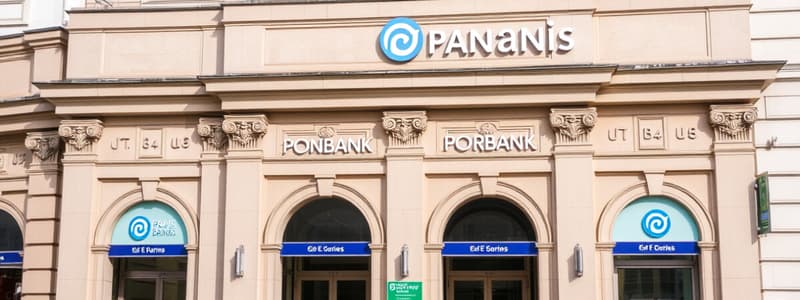Podcast
Questions and Answers
What is a depository institution?
What is a depository institution?
Business that provides financial services to hold and return money.
What are two characteristics of commercial banks? (Select all that apply)
What are two characteristics of commercial banks? (Select all that apply)
- Not-for-profit
- Usually large institutions (correct)
- Open to anyone who wants to utilize a depository institution (correct)
- For-profit (correct)
What are two characteristics of a credit union? (Select all that apply)
What are two characteristics of a credit union? (Select all that apply)
- Not-for-profit (owned by members) (correct)
- Higher interest rates and lower fees (correct)
- Membership qualifications and benefits the members (correct)
- For-profit
What does depository institution insurance cover?
What does depository institution insurance cover?
What is interest?
What is interest?
What is an interest rate?
What is an interest rate?
What is a checking account?
What is a checking account?
What is a savings account?
What is a savings account?
What is credit?
What is credit?
What is financial advice?
What is financial advice?
What is a safe deposit?
What is a safe deposit?
Match the following payment instruments with their descriptions:
Match the following payment instruments with their descriptions:
What are two activities that may be completed with online banking? (Select all that apply)
What are two activities that may be completed with online banking? (Select all that apply)
How is mobile banking different from online banking?
How is mobile banking different from online banking?
What is a debit card?
What is a debit card?
What are two activities completed with ATMs? (Select all that apply)
What are two activities completed with ATMs? (Select all that apply)
What is an overdraft fee?
What is an overdraft fee?
What is an ATM fee?
What is an ATM fee?
What is a minimum balance fee?
What is a minimum balance fee?
What is a sinking fund?
What is a sinking fund?
What is the compound interest formula?
What is the compound interest formula?
Flashcards are hidden until you start studying
Study Notes
Depository Institutions
- Businesses that provide financial services, enabling customers to hold and return money securely.
Commercial Banks
- For-profit institutions open to anyone seeking depository services.
- Typically large entities with a wide range of financial products.
Credit Unions
- Not-for-profit institutions owned by their members, with membership qualifications.
- Offer benefits that may include higher interest rates on savings and lower fees than commercial banks.
Insurance for Depository Institutions
- FDIC (Federal Deposit Insurance Corporation) insures depositors up to $250,000 per account in commercial banks.
- NCUA (National Credit Union Administration) insures credit union deposits for the same amount.
Interest
- Represents the cost of borrowing money or the earnings on saved funds; applicable to loans and savings accounts.
Interest Rate
- The percentage used to calculate interest, typically expressed as an annual rate.
Checking Account
- Designed for easy access to funds; allows check writing, cash withdrawals, and online transfers, with minimal or no interest earnings.
Savings Account
- Structured for saving rather than daily expenses; earns interest but offers limited access to funds.
Credit
- The ability to borrow money, typically through loans or credit cards, requiring repayment with interest.
Financial Advice
- Guidance on various financial matters, encompassing a range of topics related to personal finance.
Safe Deposit
- A secure storage option within a bank for valuable personal items.
Special Needs Payment Instruments
- Includes tools such as travelers checks, certified checks, cashiers checks, and money orders for specific payment purposes.
Travelers Checks
- Pre-printed checks for a fixed amount that require endorsement for cashing or payment.
Certified Checks
- Checks guaranteed by a bank, ensuring sufficient funds for payment.
Cashiers Checks
- Checks issued by a bank, drawn on its own funds and signed by a cashier, providing guaranteed payment.
Money Orders
- Printed payment orders for a specified sum, available from banks or post offices.
Online Banking Activities
- Functions performed include transferring and accessing accounts, as well as applying for credit and paying bills.
Mobile Banking
- A banking method using mobile applications that replicate the functions of online banking.
Debit Card
- A plastic card linked directly to a depository institution account, allowing for electronic transactions.
ATM Activities
- Automated Teller Machines enable actions such as withdrawing and depositing money and checking account balances.
Overdraft Fee
- A fee incurred when withdrawing more money than is available in an account.
ATM Fee
- Charged when using an ATM that is not owned by the cardholder's depository institution.
Minimum Balance Fee
- A fee applied if the account balance falls below a specified minimum threshold.
Sinking Fund
- A savings strategy for planning ahead for large purchases, allowing for systematic saving over time.
Compound Interest Formula
- Future Value (FV) is calculated using the formula: FV = PV [1 + r/m]^(mt), where "PV" is present value, "r" is the interest rate, "m" is the number of compounding periods per year, and "t" is the number of years.
Studying That Suits You
Use AI to generate personalized quizzes and flashcards to suit your learning preferences.




